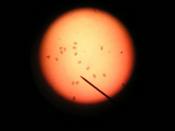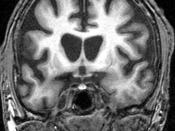Genetic Disorder: Huntington's Disease (HD)
Huntington's Disease is a disease affecting the nervous system, specifically a defect in a gene located in the brain. The gene is called huntingtin of unknown function and it affects a loss of cells in the brain that are control movement and mental abilities. This disease also known as Huntington's Chorea is a fatal disease within fifteen to thirty years of diagnosis, which usually affect people, ages thirty-five to fifty both male and female. It is passed from one parent by a logic gene. If one parent has this gene, there is a 50% chance their child will inherit it. Symptoms affect mental function, movement, and personality. Nerve cells in the brain slowly begin to waste away and gradual loses mental function. Some symptoms include:
÷Depression
÷Anxiety
÷Aggressive
÷Impulsive
÷Chorea (jerky movements of face, arms, and neck)
÷Losing ability to think logically and remember
There is no cure for this disease.
Drugs, drug therapy, and occupational therapy are used to lessen the pain and control the behavior. This disease usually ends with death most commonly weakness of respiratory and swallowing muscles allow the risk of choking on food and respiratory infections.
Parasite-induced disease: Hookworm Disease
Hookworm disease is a disease of the digestive system, specifically the small intestine. It is caused by an infection of the worm-like organisms Necator americanus and Ancylostoma duodenale. Both worms have similar life cycles producing eggs that eventually turn into larvae after six to seven weeks. They usually are found deep in soil and infect humans by being exposed to bare skin especially bare feet or hands on dirt. The larvae will bear into the skin and go to the right side of the heart where it is pumped into the lungs. The lungs become irritated and are coughed up...



Okay
I feel there was more to say about each topic of illness. If you go to webmd.com they have great to the point information that could help later on.
2 out of 2 people found this comment useful.